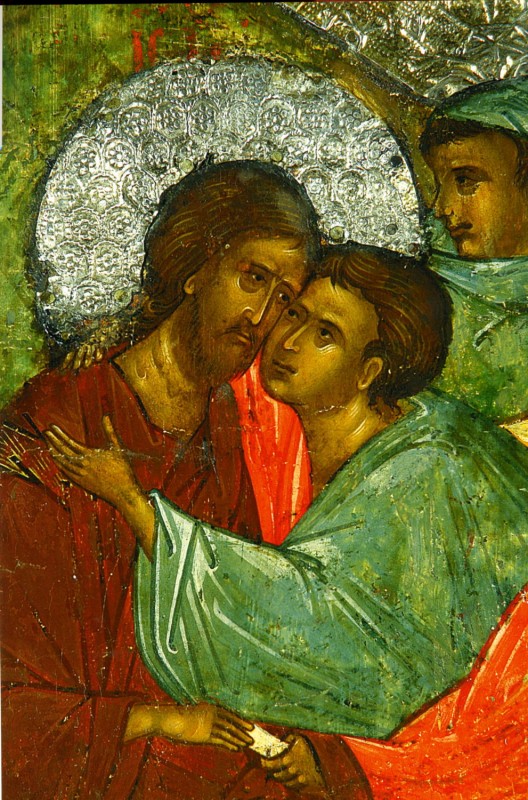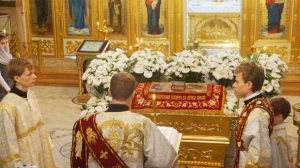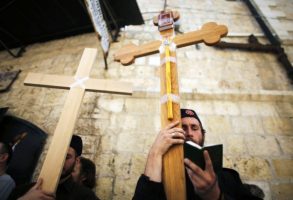Now when Jesus was in Bethany, in the house of Simon the leper, there came unto Him a woman having an alabaster box of very precious ointment, and poured it on His head, as He sat at meat. But when His disciples saw it, they had indignation, saying, To what purpose is this waste? For this ointment might have been sold for much, and given to the poor. When Jesus understood it, He said unto them, Why trouble ye the woman? for she hath wrought a good work upon Me. For ye have the poor always with you, but Me ye have not always. For in that she hath poured this ointment on My body, she did it for My burial. Verily I say unto you, wheresoever this gospel shall be preached in the whole world, there shall also this, that this woman hath done, be told for a memorial of her. Then one of the twelve, called Judas Iscariot, went unto the chief priests, and said unto them, What will give me, and I will deliver Him unto you? And they covenanted with him for thirty pieces of silver. And from that time he sought opportunity to betray Him (Matthew 26:6-16).
 In the Name of the Father, and of the Son, and of the Holy Spirit!
In the Name of the Father, and of the Son, and of the Holy Spirit!
Brother and sisters, I greet you all on the midpoint of Holy Week. These are special days, days bound up with the remembrance of the Sacred History of our Church, with the remembrance of the Lord going to His suffering on the Cross, which was dreadful and awful, but saving for us. We follow our Lord and Savior with the Holy Evangelists through the pages of Holy Scripture.
In today’s Gospel reading we heard how the Lord entered the house of Simon the leper and how the sinful woman – who, it goes without saying, was among the multitude of people in the city who saw the Lord, heard His words, witnessed His miracles, and heard much of what the Lord had hitherto wrought – found the opportunity to enter this sick man’s house and, with the last of her money, to acquire precious myrrh, which she poured on the Savior’s head. And the Lord said that this event, which prepared Him for His suffering and death on the Cross, would always be remembered in the Church.
And, indeed, it has been remembered. We remember this event in the context of another person who also walked alongside the Lord and Savior, listened to His Divine words, and witnessed the many miraculous signs wrought by Him, healing the sick and raising the dead, but who had other priorities in life: not the service of God, but the service of mammon, the service of riches. We, of course, understand of whom we are speaking. We are speaking of one of the Savior’s disciples, one of the twelve, one of the closest – Judas Iscariot. He who had the secret chest into which he put money taken from others – this person of unclean conscience, this embezzler, this lover of money – rebukes the woman who had given the last she had for the Lord: “It would have been better to sell this myrrh and give the money to the poor.” Who but Judas would say such a thing? Because, owing to his mindless and reckless love for money and riches, he agreed to the vilest and nastiest thing there could ever be in human history: betrayal.
Whom did he betray? His Teacher, by Whom he had been nourished, by Whom he had been instructed, with Whom he was close, with Whom he shared meals. He betrayed Him! For a penny, for a pittance. The miserable price for which this crime was accomplished is dreadful to consider. Of course, the Savior and His earthly life cannot be measured by money. It is measured by something entirely different, not by thirty pieces of silver. But now we are not engaging in measurement, but in speaking of how this person so loved money that he imputed the life of his Teacher as nothing. We are horrified by this event. We are so horrified that the Church established Wednesday, the day of the Savior’s betrayal by Judas, as a day of fasting, a day of mourning, a day of remembrance throughout the entire year, just like the day of His suffering on the Cross. This day reminds us of how important it is not to be deceived in mind and heart, not to cling to anything unsubstantial, unnecessary, and corruptible.
If we take a close and honest look at our lives, I think we will all be horrified by the ubiquity of the sin of love of money. Everything is measured by money: human prosperity, position, power, electability, and even life itself. We are witnessing how – for some pieces of papers, for currency notes – someone can be killed for nothing at all. We are witnessing the horror of how – for three rubles in a moneybag – someone can be killed, deprived of his life, in an entryway. What is this? It is the sin of love of money. A phenomenon that is natural in our lives, but unnatural in the eyes of God, is avarice – which today we call bribery. It seems that anyone can be bought off and people take advantage of this. This is also part of the sin of Judas. But today one buys someone off to get a better place or position in life, and tomorrow another step is taken. This person will pay money to have someone else killed.
Today the Lord reveals a great mystery to us: the mystery of charity, the mystery of mercy. He speaks today from the pages of Holy Scripture, addressing each one of us and our Fatherland: do not make money the cornerstone of your life, for the result will be lamentable. This does not mean that one must completely renounce it. The Lord gives us as much as is needed for the sustenance and maintenance of our lives. But we should not bind our lives with this filthy lucre, we should not measure human feelings therewith, we should not measure human life or our human dignity therewith.
The Church reminds us in the days of Holy Week: fear love of money, fear the sins associated with it, fear clinging to money. But do not fear giving: for the hand that gives shall not lack. It is no accident that the Lord and the Holy Church speak of this to us in the days of Holy Week. This sin is too fine, too pernicious, too corrosive for our soul; it is a sin separated by a thin, semi-permeable membrane from the sin of betrayal.
My friends, remembering the terrible sin of Judas today, let us avoid placing the meaning of our lives in having money. Let us regard it as something completely natural: if God gives, then glory to God; if not, then tomorrow He shall. This does not mean that we should not work hard. This does not mean that we should not take care for the nourishment and prosperity of our family. No. But we should not live in such a way that these pieces of paper close our eyes from the world around us. This is what the Holy Church reminds us of today. And may God grant us the strength not to be deceived in heart or mind, and not to set out on the path followed by that evil disciple of our Lord and Savior Jesus Christ! Amen.
Delivered in the Church of All Saints in Vsekhsviatskoe, 2011.




















